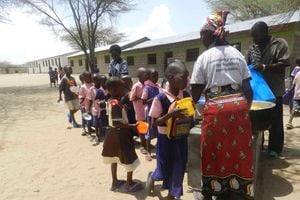
Nairobi Governor Johnson Sakaja at his office in Nairobi.
Nairobi Governor Johnson Sakaja has blamed the curse of one term in some counties for stalled multibillion-shilling projects. He says some regions, including Nairobi, have not exploited their potential since the inception of devolution in 2013 for replacing governors after every election.
The Constitution provides for a maximum of two terms, five years each, for county bosses, but some counties such as Nairobi and Kiambu have had as many as four governors while others have elected new leaders every five years.
In an exclusive interview with Nation, Mr Sakaja said new governors have abandoned old projects by predecessors instead initiating their own. This, he said, has led to the loss of billions of taxpayers’ money in stalled projects. He said he has been forced to balance completing some of the projects initiated by his predecessors and starting his own amid resource squeeze.
Mr Sakaja – who has since become a close ally of ODM leader Raila Odinga after a dramatic supremacy battle with former Deputy President Rigathi Gachagua, said he was delivering on his pre-election pledges to be the first one to beat the curse in the capital city.
Nairobi had Dr Evans Kidero as its pioneer governor. He was unseated in 2017 by Mr Mike Sonko, who did not complete his term after he was impeached and replaced by Ms Ann Kananu in 2021. Ms Kananu served with Lt-Gen Mohamed Badi at the Nairobi Metropolitan Services, until Governor Sakaja was sworn-in after the August 2022 elections.
Mr Sakaja listed his school feeding program dubbed Dishi na County as one of his game-changing achievements. He said the Sh5 for a meal for learners has endeared him to the electorate. He also cited improved revenue collection, better healthcare and his response to the perennial water shortage in the city. He is also seen to be leveraging the truce between President William Ruto and Mr Odinga to secure a second term. Mr Odinga has for years remained influential in the city politics.
Here are the excerpts of the interview:
Q: Some of the city roads are in bad status; what is the plan?
We have been increasing the allocation on what we call the ward-based roads. The highest allocation before had been Sh200 million. Last year we did Sh735 million; this year we've done Sh950 million.
The Roads Act classifies roads in terms of national and county. And you have roads which are national trunk that connect different counties, the bypasses; those ones mainly are under Kenha. Then you have county roads within many of the estates that are under our purview.
All those stalled or unfinished NMS projects were moved to be concluded at the national level for audit purposes. So I am very happy that the President has created a good environment of partnership between Nairobi and the national government, and we have had many meetings at a high level and discussions around roads or infrastructure or projects for the county.
Q; You had a plan to decongest the city by relocating matatus from the CBD?
It was for the long distance matatus to use green park because, the shorter haul ones, all the tests done, it cannot work because of the sheer human traffic. So the Bus Rapid Transit (BRT) then becomes a solution. There will be pick and drop stations; so the matatus do not then have to come all the way into town. The matatu owners are part of what we call the bus operating company. So they also have shares because of the loss of or reduction of business. We have since secured a Sh43 billion funding for the construction of Clean Core BRT line 3. The BRT will run from Dandora through Juja Road to Kenyatta National Hospital. This funding represents a significant boost to Nairobi’s transportation infrastructure. Our partners – the European Investment Bank, French Development Agencies and the European Union have approved 320 million euros. In the green park, we want to go to the Nairobi convention centre. It is the most prime part of the city. Conferencing has become a huge thing; there are no performance venues for the creative arts.
Q: There is the housing project, and the controversy over demolitions?
In the next 30 months, we intend to have concluded around 15,000 units as a county government. Because for instance, lot 1 is 1,975 houses, and we have around six different estates and lots that we have already awarded.
There's no budgetary implication on the county because ours are all PPPs. These projects were envisioned many years ago. The first two projects began during the NMS time, namely Pangani and Jeevanji. And there are lessons we've learned from those. The controversial one then became Jeevanji where we came and found that the title had been given out without following procedure. We found that it was put in a special purpose vehicle and then the developer was able to get facility from the bank. So we're engaging to make sure that we can rationalise that arrangement.
Woodley is 100 acres of historic land. But if you look at the 100 acres, the number of people there is quite low. Now we said we do it in lots. We started with lot 1. In Lot 1, there are 43 houses that are going to give way to 1,975 units of mixed houses from one bedroom to four bedrooms, from affordable housing to middle class.
Of course, there are people who are very sentimental about where they have lived for years, which is understandable because families have been raised there, children have grown up, weddings have happened and people sometimes forget you are a tenant and you feel like it's your home.
And so we've engaged in serious public participation repeatedly, including led by myself with the residents of Woodley. Then we decided to be pragmatic as a county to say look, we will give you rent money of Sh900,000 each. We gave them an allotment letter to the new house once completed, meaning we are giving our tenants a free house upon completion which they have not paid for, which they are not buying.
Q: Stalled projects have become a major issue in the counties?
If you look at the project that we are working on in Kibra, it is a project that started under Governor Kidero and stalled. If you look at Dandora that started during Mike Sonko's time, I concluded it. Upendo Healthcare in Mathare and many others. But because of limited resources I have to balance my projects and the ones started by the previous administrations, because I can't just come and only finish theirs. People will be like Hapana, wapi ya Sakaja. So it's a balance that you must have.
Q: Nairobi is leading in stalled projects at Sh1.36 billion, according to an audit report?
Of course, Nairobi will be the highest because we're like 30 counties. So we're the highest in stalled projects. We're also the highest in revenue collection. We are the highest in pending bills and how much we pay. If you look at the rise in revenue collection, Nairobi collected more than 30 counties combined. While I'm doing Sh12.8 billion, another county is excited to have done Sh200 million. And so that absolute measurement doesn't work. What you need to measure is the percentage.
Q; You recorded the highest revenue collection for 2023/2024? What is the secret?
Moving to cashless and fully automating all our 141 revenue streams. That has played a big role. Strengthening that system. Sometimes it hangs, sometimes just as any normal system would do. But we're strengthening it. Now we're working on a framework with the Ministry of ICT to make it more stable. I said, from 1st January 2024, we'll have one unified business permit. I was there with all these revenue clerks. I told them we must do it.
Q: Is the school feeding programme a success?
We're feeding 316,000 children every day at Sh5 each. School enrolment has gone up.
Q: What is the budget for the program?
Initially, it was Sh1.5 billion because of infrastructure. We built 17 kitchens. Now what we've been spending is the recurrent; the food subsidy. Of course, you know, there's no meal for Sh5, even an egg is, like Sh15, but we provide a full meal. Sometimes there's meat, fruit.
So with our Sh1.2 billion we're able to subsidise. We have the Children Investment Foundation Fund also subsidising the meal. We've subsidised Sh25; they've been able to help us with around Sh15. And so the parent pays Sh5. Performance has gone up, and attendance is 100 per cent.
Q: You have talked of increased enrolment; are there plans to have additional classrooms?
Nairobi has only 209 public schools in the 17 constituencies. Yet in the rural areas, one constituency has 150 schools. Nairobi leadership went to the President and we agreed that we must build 5,000 new classrooms. The city-county government to do 1,500, the national government to do 3,500 through NG-CDF for the primary component. There would be additional 30 to 33 classrooms in every constituency.
Q; Water remains a big problem for Nairobi residents; what plans do you have?
Because Nairobi doesn't produce its on water, it gets it from across other counties like Kiambu, Murang'a and Nyandarua. All of our sources combined give us 525.6 million litres daily, yet the demand is 900 million litres every day. So there's a deficit, and that's why we have what they call the equitable distribution programme (rationing). There were some projects which had stalled, like the Northern Collector, which we really pushed, and I'm grateful to the president for its completion. So now we've concluded the first project as we promised, the northern collector, which is adding 114 million liters of water every day to Nairobi. The president should commission it soon. We've been able to secure, proposed financing of $100m to do the next water development which is Maragwa four and Northern Corridor Collector two. But remember, demand grows by four per cent every year.
Q; In the political front, how do you relate with the other Nairobi elected leaders?
Well, we relate on a case to case basis. I consider most of them my friends. We've been in Parliament. We've been to the same party with some. It is a relationship that must respect the distinct roles. You know? I am not a member of parliament anymore. I'm not a senator. I'm the governor. The roles of the governor are clear. The roles of an MCA are clear. But if the governor wants to be an MP and the MP wants to be the MCA and the MCA is doing the governor's work, then there is a problem.
Q: Are you scared of the curse of one term in Nairobi?
Nairobi needs a chance to have an administration that runs its full course. I'll give you a county like Bungoma; they vote in governor Lusaka; he does his work. And then they remove him, and bring Wangamati to start other projects. And then they remove him, bring back Lusaka to look at his own projects.
In Nairobi, Kidero started his projects, was removed and Sonko came in and started his projects before NMS came in and started their own. Now I am here trying to finish Kidero's and Sonko’s projects. So Nairobi has not benefited fully from devolution because of this start-stop trend.










